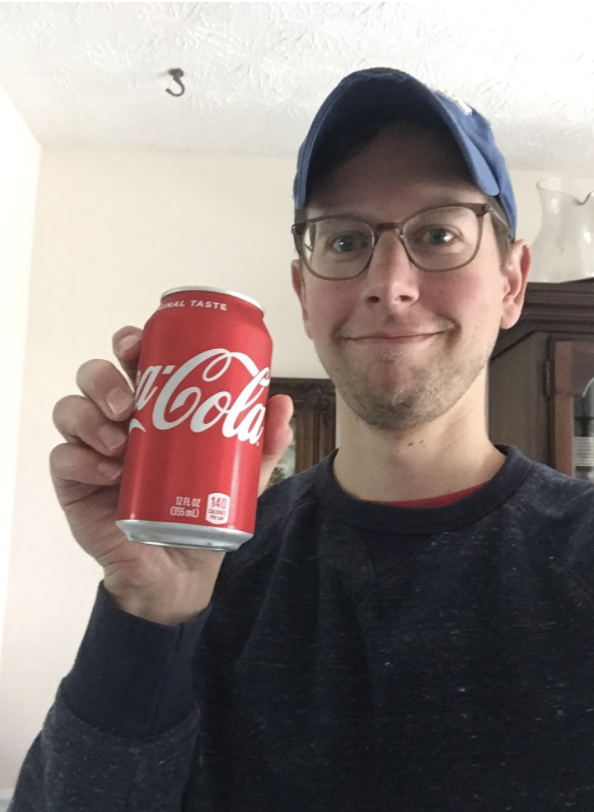Hi all, I’m delighted to introduce a guest writer to you. Today’s reflection is from C. J. Carter, a staff member at CSF and teacher at Lexington Latin School. C. J. graduated from UK with a philosophy degree and an English degree, and I have probably spent more hours arguing with him than maybe any other person. Which is why it pains me to say that he’s very smart, and I know he’ll be a delight to read.
Thanks, Derek
—
Hey everyone, thanks for sticking in there this long through the study, and thanks for letting me be a part of your walk through Philippians. If in the lockdown you’ve realized you just can’t get enough of Derek, and now I’m depriving you of your daily dose, remember what you just read from Paul: “Do everything without complaining or arguing.”
I don’t drink coffee, so here’s a picture of a coke, my equivalent of coffee. It’s better anyway.

Usually Derek gives you some interesting background about what’s pictured in the post, but this is just a can of coke. It ranks third in the list of best Cokes, behind glass-bottled cokes and McDonald’s cokes (Mexican coke can’t fit in the list because it’s a different recipe, bottled ambrosia).
Today’s passage is Philippians 3:17-21:
“Join with others in following my example, brothers, and take note of those who live according to the pattern we gave you. For, as I have often told you before and now say again even with tears, many live as enemies of the cross of Christ. Their destiny is destruction, their god is their stomach, and their glory is in their shame. Their mind is on earthly things. But our citizenship is in heaven. And we eagerly await a Savior from there, the Lord Jesus Christ, who, by the power that enables him to bring everything under his control, will transform our lowly bodies so that they will be like his glorious body.”
There were a lot of things I tried to talk about when I started writing this section. As Derek said, I’m a high school teacher. This means two things: 1) my mind is usually on some book I’m currently teaching; and 2) I slip into teaching mode easily. I wrote two or three versions of the post, referencing Narnia, Plato, Odysseus, Augustine, blah blah blah (things from books I’m reading with my students). I wrote a few pages worth of material about the appetites, loves, compulsions, citizenship, shame, heaven, etc. etc. etc.
But the more I returned to the passage, the more I got the sense that I love this passage not for the didactic lessons we could pull out of it, but for the invitation in it. It calls to our desires. It invites us to pity and hope.
***
Look back on verse nineteen: “Their destiny is destruction, their god is their stomach, and their glory is in their shame. Their mind is on earthly things.”
Paul says when he thinks of these things he is moved to tears. And just before this, he asks us to follow his example. And so I think this is an invitation to mind our own desires. To see where outposts of the enemy still hide in our hearts, and to mourn them.
Ask, Lord God, show me where I still hand myself over to myself. Reveal to me the urges and longings I still long to satisfy in my flesh. Remind me of my mind’s lost wandering. Meditate on verse nineteen through that prayer. Reread it three or four times. Let the Lord work on your heart as you read it and wait, and know he often works in silence.
Paul also weeps when he recognizes these things in others, when he sees people and a culture which have chained themselves and glory in their chains.
Ask, Lord God, bring to mind those whom you seek in their chains that I may pray for them and love them, not because I am any better, but because I now know the taste of freedom in your Spirit and I know the power of your Son to free us. Incline my heart toward them. As people come to your mind, intercede for them.
***
Next, look to verses twenty and twenty-one: “And we eagerly await a Savior from there, the Lord Jesus Christ, who, by the power that enables him to bring everything under his control, will transform our lowly bodies so that they will be like his glorious body.”
As we learn to be rightly moved to pity the hold of sin on ourselves, on others, and on the world, we also learn to direct our gaze away from despair. Paul invites us, as we await a Savior, to raise our gaze to that Savior. He invites us to rightly long for Christ, to hope.
Ask, Lord God, help me to wait on you and wait for you. As I come to love the world you love mourn its bondage, save me from despair. Help me fix my gaze upon you. Teach my heart to hope in you as I endure the effects of sin in the world. Teach me to desire you above all things, and in so desiring learn to love all things perfectly. Reread verses twenty and twenty-one three or four times. Let the Lord work on your heart as you read it and wait.
***
Today it will be fitting to finish with the Lord’s Prayer. Actually pray it.
Pray it as a declaration.
Or, if you find in the inventory of your desires a lack desire for God (as too often is the case for me), pray it as a supplication. Pray it as a way of asking the Lord to make this the prayer of your heart.
Our Father, who art in heaven,
hallowed be thy Name,
thy kingdom come,
thy will be done,
on earth as it is in heaven.
Give us this day our daily bread.
And forgive us our trespasses,
as we forgive those
who trespass against us.
And lead us not into temptation,
but deliver us from evil.
For thine is the kingdom,
and the power, and the glory,
for ever and ever. Amen.
___
P. S. After you finish this, grab yourself a coke. Two quick notes. 1) Mourning the world doesn’t mean we mope. So drink your soda and take pleasure in it! 2) When we hope for God and love him first, that doesn’t mean we ignore the world and love it less. Paradoxically, when we love God first, we’re enabled to love everything else more. And so enjoy your coke more as you learn to enjoy all things in God, as Augustine says. (I couldn’t resist!)



